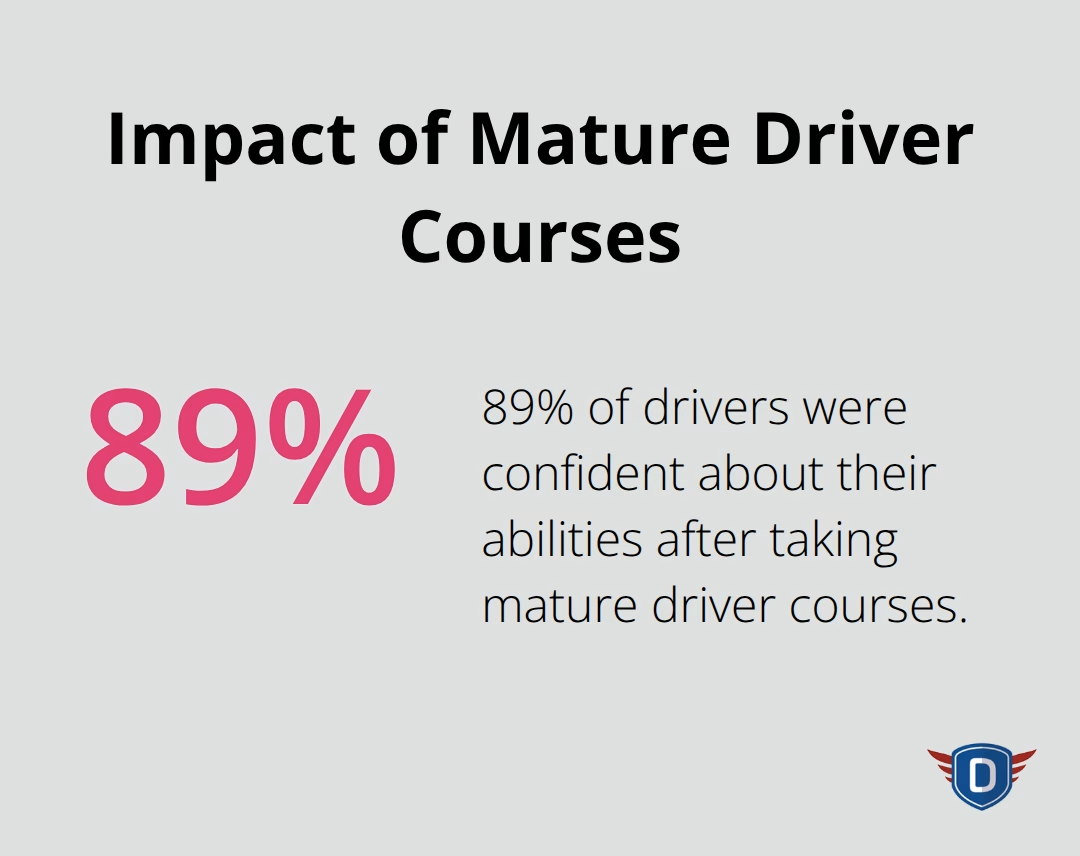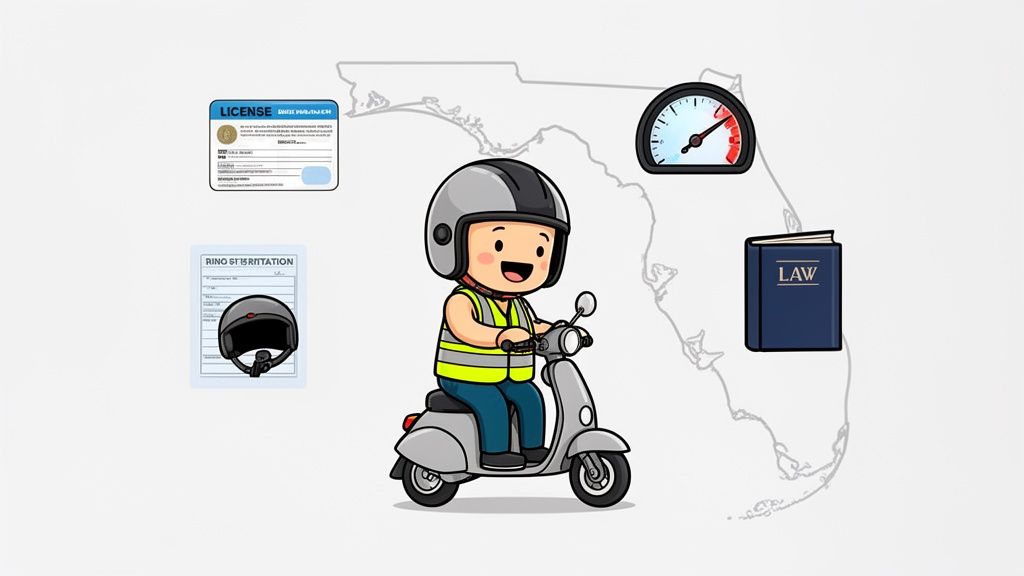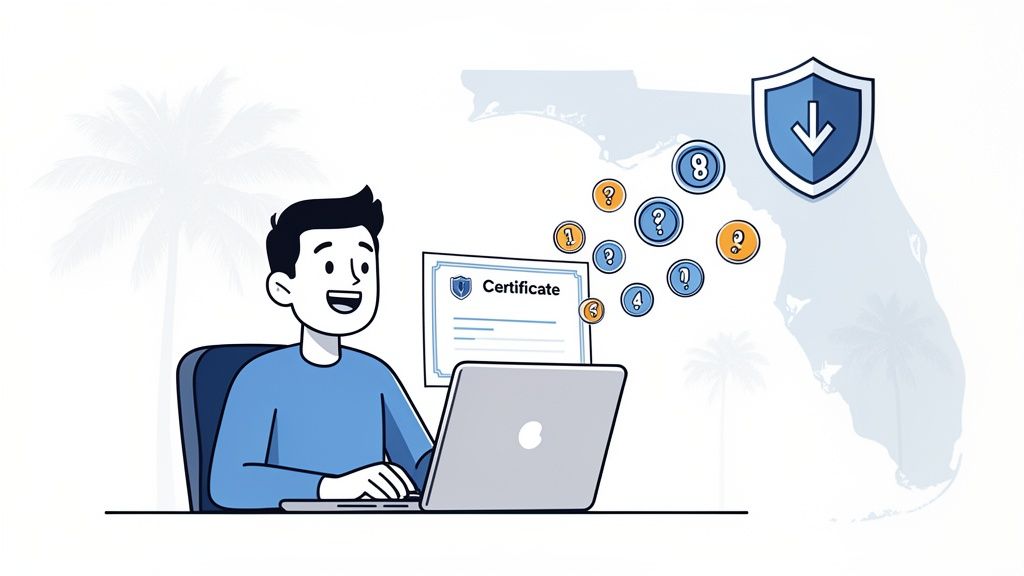Driving lessons for older adults have become increasingly popular as more seniors recognize the value of refreshing their skills behind the wheel. Age-related changes in vision, reaction time, and mobility can impact driving confidence and safety.
At DriverEducators.com, we understand that finding the right instruction requires specialized programs designed specifically for mature drivers. Professional training helps seniors adapt to these changes while maintaining their independence on the road.
Why Older Drivers Need Specialized Training
Physical Changes That Impact Driving Safety
Age affects driving abilities in measurable ways that traditional instruction often overlooks. Vision changes occur in 90% of adults over 65, with night vision declining significantly with age according to research findings. Reaction times slow by approximately 0.5 seconds per decade after age 30, which translates to an additional 37 feet of stopping distance at highway speeds. Joint stiffness reduces neck rotation by up to 75% in some seniors, which makes shoulder checks and parking maneuvers significantly more challenging.
Hearing loss affects 50% of adults over 65, which reduces awareness of emergency vehicles, horns, and engine sounds that indicate mechanical problems. Medication side effects compound these issues, with over-the-counter sleep aids alone increasing crash risk by 63% according to research from the University of Washington. These physical changes require specific training techniques that standard driving schools rarely address.

Cognitive Shifts That Require Different Teaching Methods
Processing speed decreases affect how quickly older adults respond to multiple stimuli simultaneously. The Insurance Institute for Highway Safety reports that drivers over 70 have higher fatal crash rates per mile traveled than middle-aged drivers, primarily due to slower information processing rather than recklessness. Divided attention becomes more difficult, which makes complex intersections and highway merging particularly challenging.
Memory changes affect route planning and navigation skills. Short-term memory decline means older adults need more repetition and practice time compared to younger learners. The AARP Smart Driver course data shows that 97% of participants changed at least one driving habit after specialized training (this proves that age-appropriate instruction methods work effectively).
Professional Training Delivers Measurable Results
Specialized instruction for seniors produces concrete safety improvements that family teaching cannot match. The AAA Foundation for Traffic Safety found that professionally trained older drivers had 40% fewer accidents compared to those who relied on family instruction alone. Professional instructors identify specific deficits and provide targeted solutions, such as adjusting mirrors to compensate for reduced neck mobility or teaching scanning techniques for vision limitations.
Insurance benefits make professional training financially attractive. Ninety-one percent of AARP course participants successfully obtained insurance discounts, with savings ranging from 5% to 15% annually. Many states mandate mature driver discount insurance courses for continued driving privileges after certain violations (making professional training not just beneficial but sometimes legally required for maintaining independence).
These specialized programs require careful evaluation to find the right fit for individual needs and circumstances.
How to Choose the Right Senior Driving School
Specialized Programs Make the Difference
Most driving schools treat older adults like teenage beginners, which wastes time and money. Senior-focused programs understand that mature drivers need different approaches than new learners. The American Occupational Therapy Association maintains a nationwide database of programs specifically designed for older adults. These programs focus on adaptation rather than basic skill development.
Look for schools that offer Occupational Therapist Rehabilitation Specialists on staff. These OT-DRS professionals provide comprehensive assessments that identify medical conditions that affect the ability to drive. Clinical assessments cost between $200 to $400, but they pinpoint specific deficits that standard evaluations miss. Skills Evaluators provide less expensive alternatives at $100 to $200, with focus on practical road performance rather than medical factors.
Essential Questions That Reveal Quality Programs
Ask schools about their instructor certification for senior training. Many instructors lack specialized training for age-related challenges. Request specific examples of adaptive techniques they teach, such as mirror adjustment for reduced neck mobility or scan methods for vision limitations. Schools that cannot provide concrete examples lack the expertise older drivers need.
Inquire about vehicle modifications and adaptive equipment familiarity. Professional programs should demonstrate knowledge of hand controls, spinner knobs, and other assistive devices. The instructor experience with medical conditions matters significantly. Schools that work with stroke survivors, arthritis patients, and vision-impaired drivers offer superior training compared to general programs.
Cost Analysis and Insurance Benefits
Professional senior instruction costs between $75 to $150 per hour for supplemental training after initial assessment. This investment pays for itself through insurance discounts and accident prevention. AARP research shows 89% were confident about their driving abilities after taking mature driver courses, with insurance discounts ranging from 5% to 15% annually.
Compare total program costs that include assessment fees and follow-up sessions. Some schools bundle services at reduced rates, while others charge separately for each component. Insurance providers often reimburse mature driver course completion (which makes professional training essentially free for participants who qualify). Contact your insurance company before enrollment to confirm discount eligibility and required documentation.

Once you select the right school and instructor, you need to understand what happens during the actual lessons and assessment process.
What Happens During Your First Senior Driving Lesson
Professional senior driving lessons start with comprehensive skill assessments that differ significantly from standard evaluations. Occupational Therapist Driving Rehabilitation Specialists conduct clinical assessments that examine medical history, vision tests, and cognitive screens before any road work begins. These evaluations cost between $200 to $400 but identify specific deficits that affect safety. The assessment includes reaction time tests, range of motion measurements, and medication reviews that standard schools skip entirely. Skills Evaluators offer less expensive alternatives at $100 to $200, with focus on practical road performance through controlled scenarios that reveal areas that need improvement.
Assessment Methods and Medical Reviews
Instructors review medical conditions that impact performance before road practice begins. Vision tests measure acuity, peripheral awareness, and depth perception using specialized equipment. Cognitive screens evaluate processing speed, memory function, and attention span through standardized tests. Physical assessments check range of motion, strength, and coordination that affect vehicle operation. Medication reviews identify prescriptions that cause drowsiness, dizziness, or slower reaction time that can affect driving safety.
Adaptive Equipment and Vehicle Modifications
Professional instructors introduce adaptive equipment based on assessment results. Hand controls allow drivers with leg mobility issues to operate gas and brake pedals with hand movements. Spinner knobs attach to wheels for single-handed operation when arm strength or shoulder mobility becomes limited. Mirror extensions and wide-angle mirrors compensate for reduced neck rotation that affects many seniors. Left foot accelerator pedals help drivers who cannot use their right foot effectively. Seat cushions and back supports improve posture and visibility for shorter drivers. These modifications cost between $100 to $1,500 but insurance often covers medically necessary equipment.
Real-World Practice Scenarios
Senior lessons focus on specific situations that challenge older drivers most frequently. Night practice addresses vision changes that affect many older adults, with instructors who teach compensatory scan techniques and proper headlight usage. Highway merges receive extensive attention since processing speed decreases make gap judgment difficult for mature drivers. Parking lot practice emphasizes reverse maneuvers and spatial awareness with verbal cues and mirror position strategies. Intersection navigation gets priority treatment because Insurance Institute for Highway Safety data shows older drivers have highest accident rates at complex intersections (weather condition practice prepares seniors for rain and reduced visibility scenarios that require different follow distances and speed adjustments).
Final Thoughts
Professional driving lessons for older adults represent a smart investment in safety and independence that pays dividends for years. The statistics speak clearly: 97% of seniors who completed specialized training changed at least one driving habit, while 91% successfully obtained insurance discounts that average 5% to 15% annually. These programs address age-related changes through proven methods that family instruction cannot match.
The long-term benefits extend beyond immediate skill improvement. Professional training builds confidence that helps seniors maintain mobility longer while it reduces accident risk by 40% compared to untrained drivers. Regular refresher courses keep skills sharp as physical and cognitive abilities change over time (which affects everyone differently).
Action starts with the selection of qualified instructors who understand senior-specific challenges. At DriverEducators.com, we connect you with certified instructors who provide personalized guidance in supportive environments. Professional assessment identifies specific needs while adaptive techniques address individual limitations effectively. The investment in specialized instruction protects both safety and independence for mature drivers who want to continue their mobility with confidence.






